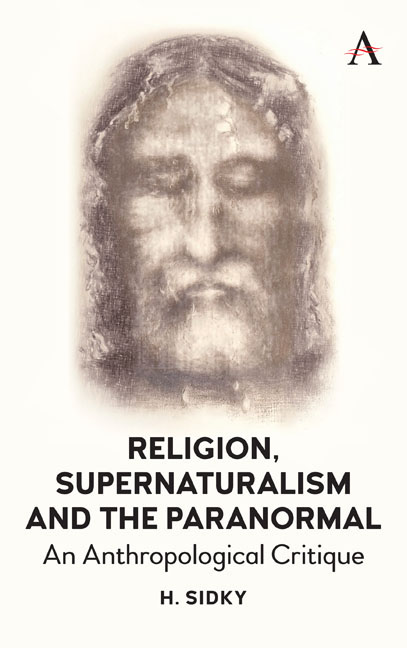Book contents
- Frontmatter
- Dedication
- Contents
- Acknowledgments
- Introduction
- Chapter One The Problem with Religion: Preliminary Issues
- Chapter Two The Unreal Real: The Supernatural, Religion, and the Paranormal
- Chapter Three Can Science Say Anything About Religion and the Supernatural?
- Chapter Four Ghostly Rappings, the Science of the Soul, and the Religious Nature of the Paranormal
- Chapter Five Ghostly Encounters in the Field: Anthropology of the Paranormal or Paranormal Anthropology?
- Chapter Six Why We Think the World Is Haunted
- Chapter Seven Cognitive Biases and Why People Think Eerie Thoughts
- Chapter Eight Miracles as Evidence of God's Actions in the World
- Chapter Nine When God Talks to People: Are Religious Experience Evidence of God?
- Chapter Ten Books Authored by God? Sacred Texts as Evidence of the Supernatural
- Chapter Eleven God's Fingerprints in the Natural World: Intelligent Design, Irreducible Complexity, and Cosmic Fine-Tuning
- Chapter Twelve The Miracles of the Bible: The Quintessential Foundations of Paranormal Beliefs in Western Culture
- Chapter Thirteen Jesus the Miracle Worker, Magician, and Sorcerer
- Chapter Fourteen Jesus's Empty Tomb, Missing Body, and Return from The Dead: Sources for the Paranormal Tale
- Chapter Fifteen The Post-Resurrection Appearances in the New Testament
- Chapter Sixteen Coping with Failed Prophesy: A Socio-Psychological Explanation for the Rise of Christianity
- Chapter Seventeen Conclusions: Why Religious and Paranormal Beliefs Persist and Their Dangers
- References
- Index
Chapter Two - The Unreal Real: The Supernatural, Religion, and the Paranormal
Published online by Cambridge University Press: 16 December 2019
- Frontmatter
- Dedication
- Contents
- Acknowledgments
- Introduction
- Chapter One The Problem with Religion: Preliminary Issues
- Chapter Two The Unreal Real: The Supernatural, Religion, and the Paranormal
- Chapter Three Can Science Say Anything About Religion and the Supernatural?
- Chapter Four Ghostly Rappings, the Science of the Soul, and the Religious Nature of the Paranormal
- Chapter Five Ghostly Encounters in the Field: Anthropology of the Paranormal or Paranormal Anthropology?
- Chapter Six Why We Think the World Is Haunted
- Chapter Seven Cognitive Biases and Why People Think Eerie Thoughts
- Chapter Eight Miracles as Evidence of God's Actions in the World
- Chapter Nine When God Talks to People: Are Religious Experience Evidence of God?
- Chapter Ten Books Authored by God? Sacred Texts as Evidence of the Supernatural
- Chapter Eleven God's Fingerprints in the Natural World: Intelligent Design, Irreducible Complexity, and Cosmic Fine-Tuning
- Chapter Twelve The Miracles of the Bible: The Quintessential Foundations of Paranormal Beliefs in Western Culture
- Chapter Thirteen Jesus the Miracle Worker, Magician, and Sorcerer
- Chapter Fourteen Jesus's Empty Tomb, Missing Body, and Return from The Dead: Sources for the Paranormal Tale
- Chapter Fifteen The Post-Resurrection Appearances in the New Testament
- Chapter Sixteen Coping with Failed Prophesy: A Socio-Psychological Explanation for the Rise of Christianity
- Chapter Seventeen Conclusions: Why Religious and Paranormal Beliefs Persist and Their Dangers
- References
- Index
Summary
Terms such as supernatural, metaphysical, and nonempirical reality are, in fact, oxymorons. It would make as much sense to talk about the “unreal real.”
— James Lett, Science, Religion, and Anthropology (1997)The unexplained is not supernatural.
— Michael Scriven, Science, Primary Philosophy (1966)Words such as religion, supernatural, and paranormal refer to transcendental realities, beings, and forces. These terms are very imprecise, and the boundaries of the purported phenomena which they denote are fuzzy. The first question to ask is, What makes something religious rather than supernatural or paranormal? Consider the following: Why is a late-night visitation by an androgynous being with wings, that is, an angel, deemed to belong to the realm of religion, while a similar nocturnal appearance by another androgynous but wingless creature, the occupant of an extraterrestrial spacecraft, considered to belong to the domain of the paranormal? Are beliefs in the existence of ghosts or souls part of religion or the supernatural? Alternatively, are they paranormal? Some conceptual clarification is necessary before we can proceed further.
What Is the Supernatural?
The term “supernatural” comes from the Latin supernaturalis that was in use during the Middle Ages to describe the miracles of God mentioned in the Bible and the prodigies associated with the Christian cult of saints (Bartlett 2008: 9– 17, 2013: 3– 26). This concept was brought into theological discourse by the great Christian theologian Thomas Aquinas during the thirteenth century. It was juxtaposed with the ideas of natura and naturalis, “nature” or “natural,” and was an aspect of the theological discussions of the time about the world of people and the spirit world. As the theistic philosopher William Shea (1984: 308) has pointed out, understandings of supernatural are framed in relation to “nature” and “natural,” so that the meaning of one term is “dialectically coupled” with the comprehension of the other term. However, medieval thinkers concerned with the supernatural and natural struggled with the distinctions between these concepts. As the historian Robert Bartlett (2008: 26) has put it, “the categories and definitions used for discussing the natural and the supernatural were fluid, potentially contradictory, and often indeed unexamined.”
- Type
- Chapter
- Information
- Religion, Supernaturalism, the Paranormal and PseudoscienceAn Anthropological Critique, pp. 39 - 56Publisher: Anthem PressPrint publication year: 2019

